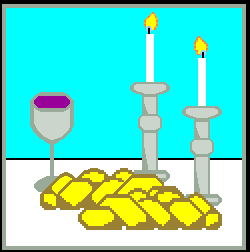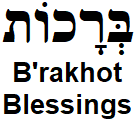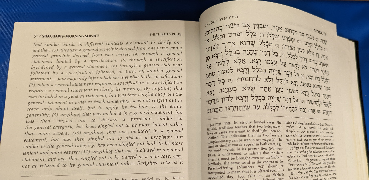Please note that this page contain the name of God.
If you print it out, please treat it with appropriate respect.If you do not have experience reading transliteration
please see the Guide to Transliteration.
At the beginning of Shabbat, candles are lit by the woman of the household (if there are no females over 12 years old present, a man may do this). They are lit before Shabbat begins, at least 18 minutes before sunset. She lights two candles, passes her hands over the candles a few times, then covers her eyes and recites this blessing. After the blessing is complete, she uncovers her eyes and looks at the lit candles as if for the first time.
What is the reason for this odd procedure? Normally, blessings are recited before you do the thing that you are saying the blessing for, so normally you would say the blessing before lighting the candles. But once this blessing is complete, Shabbat is in effect for the household, and you can't light a fire! So you light the candles first, cover your eyes so you don't see that they are lit while you say the blessing, then look at the candles as if they were newly lit after the blessing.
Note, by the way, that we are not "blessing" the candles (or the wine or bread later). It's not a blessing of the candles; it's a blessing over the candles. It's more of a, "Hey, God! Look at us! We're doing this thing you told us to do!" The word "blessed" (barukh) in this prayer refers not to the candles, but to God, who sanctified us by giving us the opportunity to earn merit by fulfilling this simple obligation.
Kiddush is a prayer expressing the sanctity (kiddushah) of the day. The first paragraph comes from the book of Genesis, telling the story of the creation of Shabbat during the first seven days of Creation. This paragraph is added to the beginning of the kiddush for any festival if the festival day falls on Shabbat. This is followed by the standard prayer over wine (borei p'ri hagafen) or other beverage. Finally comes the blessing for Shabbat, which expresses joy for the gift of this day of rest that we were given as a dual memorial of Creation and the Exodus from Egypt.
In the household, this prayer is normally recited at the dinner table leading up to the evening meal of Shabbat. The meal is in the kitchen ready to be served or is already on the table. The challah (sweet, eggy bread loaves or rolls) are also on the table, covered with a decorative cover or a paper towel. A tradition teaches that this covering is to avoid hurting the challah's feelings that the wine is being blessed first, but the more practical reason has to do with the rules of prayer sequence: a blessing over bread takes priority over the blessing over any other food and serves as a blessing for all of it, so no other blessings are needed after that. The bread is covered, allowing us to change the sequence and say the blessing over wine first.
Kiddush is recited while the leader holds a cup of wine or other beverage, no less than 3.3 ounces (about 1/4 cup). A Dixie cup is sufficient for this purpose, though a more decorative cup set aside for this purpose is commonly used. Others present can use a smaller amount of wine (synagogues commonly use plastic shot glasses) or can drink from the main cup after the blessing. If wine or grape juice is not available, Kiddush can be recited over another beverage. In a pinch, I have made Kiddush over Coca-Cola and over brandy (don't drink the whole 1/4 cup of THAT at one time!). If using an alternate beverage, you should substitute shehakol nih'yeh bid'varo (by whose will all things come to be) for borei p'ri hagafen (who creates the fruit of the vine).
The wine or other beverage is held in the right hand while standing when reciting the blessing. Drink the wine after the blessing is complete.
Genesis 1:31 to 2:3
Prayer over Wine (or other beverage)
if using wine or grape juice
if using other liquids
Sanctification of Shabbat
Netilat yadayim is traditionally a procedure that should be performed before any meal with bread. The Shabbat evening meal is traditionally served with challah (sweet, eggy bread), so this is performed before the blessing over the bread.
Each person in the household should "wash" hands by filling a cup with water and splashing a bit of it over the top and bottom of the right hand two or three times and then two or three times on the top and bottom of the left hand (reverse the order if you are left-handed; the dominant hand should be washed first). The cup that is used is commonly a two-handled washing cup to simplify the transfer from one hand to the other. These washing cups are available in simple plastic, aluminum, glass, ceramic and other materials. There is no specific requirement for the cup, but it is preferred to use some kind of cup rather than simply rinsing under the faucet, and preferred to have a cup that is big enough to complete the procedure for one person rather than having to refill in the middle. Before wiping the hands dry on a towel, the blessing below should be recited.
Note that this "washing" is more of a purification than physical cleaning. If your hands are actually dirty, you should wash them properly with soap and water before doing this.
Why is there no "Amen" at the end of this blessing? With the other blessings on this page, a leader says the blessing on behalf of everyone, and the others say "Amen," accepting the leader's blessing as their own. With n'tilat yadayim, each person traditionaly washes their own hands, and each person says their own blessing. You don't say "Amen" to your own blessing, and everybody says their own n'tilat yadayim, so there is no need to accept another person's blessing!
Immediately after washing hands and before eating, the head of the household removes the cover from the two challah loaves, lifting them while reciting the following blessing. The challah is then ripped into pieces or sliced and passed around the table, so that each person may have a piece. The piece is typically dipped in salt (just a little tap), in memory of the Temple sacrifices that were offered with salt. Between Rosh Hashanah and Sukkot, the piece is dipped in honey instead of salt, representing our hopes for a sweet new year. The family meal may then begin.
This practice of saying this blessing, tearing the bread and eating a piece is a traditional practice, done at all meals with bread any time of day and any day. It is the source of the expression "breaking bread" as a term for having a meal together.
 Shabbat
Shabbat Havdalah Home Ritual
Havdalah Home Ritual Common Prayers and Blessings
Common Prayers and Blessings Prayers and Blessings
Prayers and Blessings Jewish Liturgy
Jewish Liturgy